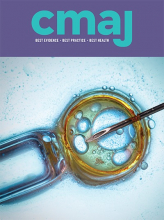Publications in academic journals can have a profound impact on changing practice and supporting policies. However, when authors fail to disclose their competing interests, it can affect a journal’s credibility. Such lack of transparency can also undermine public faith in the scientific record, particularly as this problem has been front-page news recently. Notifications about major omissions come at a depressingly regular pace from the watchdog Retraction Watch. Even the perception, rather than the reality, that author conflicts have been obscured can have an impact.1
The International Committee of Medical Journal Editors (ICMJE) has recently revised its guidance on competing interests:1 deliberate failure to disclose competing interests is academic misconduct, requiring initiation of appropriate procedures,2 which may include notification of the author’s institution and funders. As a journal that follows ICMJE’s recommendations, CMAJ is implementing this guidance.
We all have financial and personal interests, academic or institutional affiliations, or political or religious beliefs that may be competing interests.3 A problem arises when these affect our work. For journal editors, for example, competing interests can influence any part of the publication process, from forming an opinion on the design and conduct of a study through to peer review and editorial decision-making.
In common with other ICMJE journals, CMAJ has a longstanding policy that requires authors to declare their competing interests on submission of an article and to complete the ICMJE declaration form. The form covers financial support for the submitted work, other relevant financial activities within the past 36 months, intellectual property, and any other relationships or activities that may be perceived to have influenced the submission. This information is available to peer reviewers and editors who evaluate the article and is included for readers in the published version. We also ask that peer reviewers and editors disclose their competing interests related to a submitted article and to recuse themselves accordingly.
What has changed, though, is how ICMJE journals — including CMAJ — will be handling undisclosed competing interests. Given the profound effect of deliberate failure to disclose competing interests on scientific integrity, the ICMJE recognizes these intentional omissions as academic misconduct, whether they come to light before or after publication.1 Journals have typically published a correction after the fact to ensure that missing information is added to the published record. This may be accompanied by an editor’s note. Rarely has a published article been retracted for failure to disclose. For undisclosed competing interests that are identified during the publication process, editors have had several options available to them, ranging from adding missing competing interests at the time of publication to outright rejection.
Now, according to the ICMJE, journal editors have a responsibility, on discovering an undisclosed competing interest, to initiate a cascade of procedures such as those outlined by the Committee on Publication Ethics.2 Depending on the situation, these may include publication of an expression of concern, investigation by the author’s institution and retraction of the article. It is now insufficient simply to add the missing competing interests to the article.
It is important to note that this guidance is related to intentional failure to disclose competing interests. We understand that sometimes mistakes are made on submission. Authors can protect themselves by keeping an ongoing list of their financial and other arrangements to refer to when completing the ICMJE declaration form. Some manuscript submission systems, such as the one used by CMAJ, require authors to check “yes” or “no” on submission as to whether they have competing interests and to describe these briefly. In our experience, accurate completion of this question is often overlooked.
We encourage authors to complete the declaration form themselves and to review the information in the submission carefully, rather than delegating these important tasks. Institutions can also assist by keeping and regularly updating a database of competing interests for their staff. Employing a publications officer, who can help with ensuring that submitted information and materials are complete, is also helpful.4
As CMAJ implements the ICMJE’s new policy on managing undisclosed competing interests, we urge readers to remember that ensuring research integrity is up to all of us. We will be taking our responsibility for vigilance seriously, but transparency of the published record is not solely the responsibility of journal editors. It requires the active involvement of everyone from funders to readers.
Footnotes
Competing interests: See www.cmaj.ca/site/misc/cmaj_staff.xhtml











